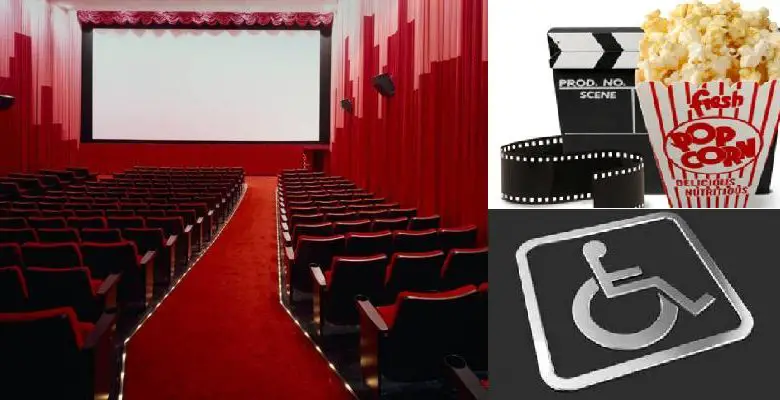
Trailblazing the way forward: making cinemas accessible
Seeing the latest film at a local cinema is something that millions of people up and down the country enjoy on a regular basis. However, the standard of access at cinemas can vary. Tanvi Vyas, from London, talks about a project she is working on with the Muscular Dystrophy Trailblazers to campaign to help improve cinema access across the country.
My name is Tanvi Vyas, and I am the Campaigns Officer for the Muscular Dystrophy Campaign Trailblazers. I also happen to have a neuromuscular condition and use a powered wheelchair.
Trailblazers is a network of young disabled campaigners – probably the largest group of its kind, with around 350 members from all over the UK. Together we campaign on the social challenges that are affecting young disabled people on an everyday basis, including access to higher education and the job market, use of public transport, using leisure facilities as a young disabled person and tourism and travel with a disability. Members of the group are generally aged 16-35, and most will be disabled due to a muscle-wasting condition or muscle disease, but the network has its door open to anyone who feels strongly about the issues we tackle.
We focus on finding practical solutions to the obstacles that we highlight – it’s not about dwelling on the negative, it’s about making a difference, working with decision makers and raising awareness of challenges that many non disabled people may not be aware of, or may be unsure of how to address.
All of our campaigns are sparked by Trailblazers’ own experiences or struggles, which come to light at regional group meetings and events, through blogs or are put forward to us as suggestions. Our latest project follows on from a campaign on social facilities that we ran in 2009, Calling Time, which examined young disabled people’s experiences of using bars, clubs, theatres, sports facilities and cinemas.
Movie venues in particular were raising some real challenges for Trailblazers, and we wondered why. Going to watch a movie is of course a very popular social pastime – and one that doesn’t require any physical strength whatsoever. A visit to the cinema should be an easy option for disabled people on a night out with friends of family.
Yet members of our network reported disabled seating as automatically meaning the worst seats in the house, painful, uncomfortable or obstructed views of screens, limited choice, sub-standard booking facilities and some fairly shocking customer service anecdotes – several Trailblazers had been told by staff they were “fire hazards”. With around 12% of the cinema audience being disabled, it seemed about time the cinema industry drastically improved the experience of a key customer base.
We launched our Lights, Camera, Access campaign, on accessibility and service at the movies for disabled cinema-lovers in December 2010. It has included a major investigation into facilities nation-wide, published as The Big Picture, and the making of our first documentary, featuring evidence from Trailblazers, and interviews with cinema architects, health and safety experts and figures from within the British film industry.
We began by asking Trailblazers across the UK to rate local cinemas and share their experiences. 115 independent and major cinema chain venues were reviewed by over 100 campaigners. The research revealed problems buying or booking tickets online – almost half of venues didn’t offer this service for wheelchair-accessible seating – and staff members unaware of the needs of their disabled customers. Trailblazers were particularly frustrated by a lack of choice when it came to seating and by being separated from friends and family or forced to painfully strain necks just to be able to see the screen.
Perhaps surprisingly, on the whole, independent cinemas faired better than the chain operated cinemas, and we saw clearly that tight budgets and listed buildings needn’t be insurmountable obstacles to giving disabled customers a great experience – if a willingness to think carefully and creatively is there. For example, eight out of ten independent venues had comfortable viewing angles in comparison to over half of chain cinemas having uncomfortable seating. The CEA card, which offers disabled cinema-goers a discount, was accepted in 96% of the independent cinemas surveys, but 1 in 5 of the larger chains did not have a discount for disabled people or their carers.
Our short film Lights, Camera, Access has helped us to explore some of the issues that came out of the report, and to challenge assumptions that health and safety issues and building regulations were tying the hands of cinemas on improving services for disabled customers. The film is going to be released later this year, and the trailer is available to view on our website. It is currently being screened at some independent cinemas across England, with more to follow.
We have also launched a petition for people that would like to support the campaign. You can back us by signing it, and adding your name to calls for cinema operators to commit to our charter of best practice for their disabled customers. We want to see improved staff training, more accurate information and a clear and thorough consideration for disabled customers an automatic aspect of future cinema design.
We launched an All Party Parliamentary Group for Young Disabled People earlier this year, to help us make the recommendations in our reports a reality, and are now backed by a group of very supportive MPs. Our Chair, Paul Maynard MP, will be inviting cinema owners and operators to attend a group evidence session on good disability practice in the cinema industry in December. This will give us an opportunity to tackle some of these issues face to face with industry decision makers.
A lot of these challenges won’t be solved overnight. By working together with other young disabled people we can start to make the cinema industry sit up and take notice of what their disabled customers really want and need, and begin to tackle the inconsistency that disabled movie-lovers face.
By Tanvi Vyas
For more information about the MDC Trailblazers, click here.
